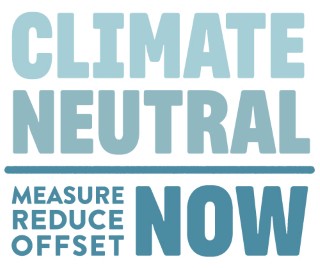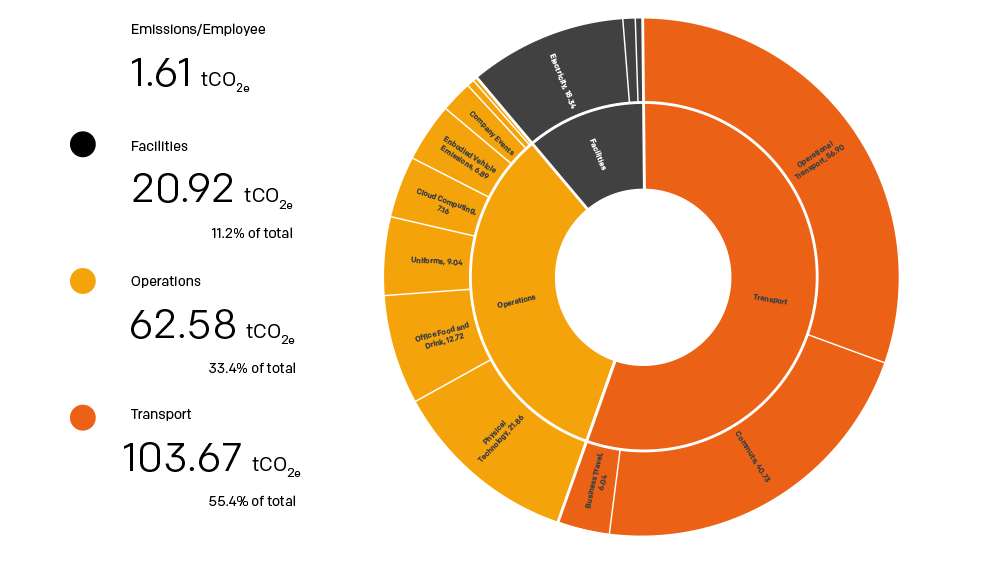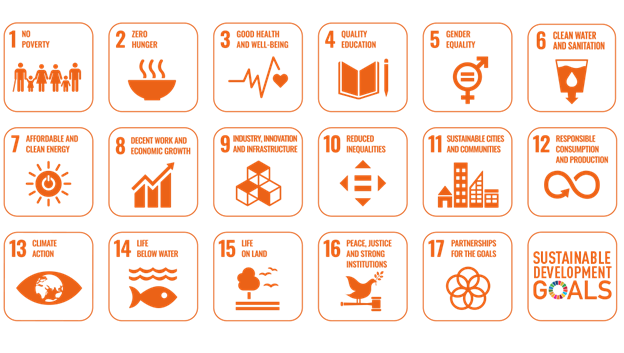
This has been a rough year for everyone, and it’s easy to feel a bit ground down by all the negativity that’s come from the past few months. We wanted to bring a bit of positivity to 2020 and have some good news to share, so we’re delighted to announce that The Keyholding Company are now signatories to the UN’s Climate Neutral Now initiative – we’ve gone carbon neutral!

We know that going carbon neutral is something a lot of companies are interested in pursuing, but it can look like a daunting challenge. We felt the same way a few months ago, so we wanted to share our journey to give you a sense of what’s involved, and a few pointers based on what we’ve learned. And the good news? Going carbon neutral is quicker, easier, and much less expensive than we anticipated.
What exactly does ‘carbon neutral’ mean?
If you’re not 100% clear on the lingo: ‘carbon neutral’ simply means calculating our carbon footprint and investing in carbon offsets to counteract them, whilst at the same time doing everything we can to reduce our footprint.
We’ve always been committed to keeping our carbon footprint as low as possible, but earlier this year, we decided to up our game. We had practices in places (responsible paper usage, ethically-sourced coffee, ditching single-use plastic – you know the drill) but we felt we could be doing more. The Keyholding Company is the UK’s number 1 keyholding and alarm response specialist, operating the largest network of security professionals in the country, with over 200 partners around the UK, servicing over 31,000 properties with security services that include internal and external patrols, locking and unlocking and vacant property checks. It’s a complex, ever-moving logistical operation, and we’re very proud of what we do, but basically… that’s a lot of vehicles.
The Problem
In 2019, the UK became the first major economy to pass a net zero emissions law. That means the government has made a commitment to reducing carbon emissions by 100% (compared with 1990 emissions) by 2050. We felt we could make a contribution to this commitment. According to the latest figures, 28% of the UK’s emissions come from transport, which accounts for 126 million tonnes of CO2 equivalent, and as we rely on whizzing security officers around the country as efficiently as possible 24 hours a day, we knew we had to lead the charge in decreasing our impact on the planet.
Enter Lucas. Lucas is our Tech Director, and as well as being a technology wizard, he’s our company’s environmental Jiminy Cricket, passionate about climate change awareness and carbon reduction. He was the obvious candidate to champion the project, and so volunteered himself to be our Environmental Rep, taking on the task of figuring out a pathway to carbon-neutrality, starting with… well, where to start.
‘It was clear that although transport was going to be our main contributor, it wasn’t the full picture. In order to make really significant changes, I needed to conduct a carbon footprint audit that would give us an accurate, thorough measure of every aspect of our emissions so we could start working out a strategy to address them. Finding Alectro was a real breakthrough. They were exactly what we were looking for: an amazing company who help companies conduct rigorous, transparent and complete carbon footprint analyses, using sophisticated UN-approved data models. I was pleasantly surprised by how easy, fast and reasonably-priced the process turned out to be: they were very thorough in their data collation, and we always felt like we were in expert hands.’
Lucas Gundry, Tech Director / Environmental rep / Jiminy Cricket
The Solution:
Step One: Getting a Clear Picture
The truth is that many companies who assess their carbon footprint only calculate their ‘Scope 1’ and ‘Scope 2’ emissions – that is, all their direct emissions (company vehicles, building heating and cooling, etc.) and their indirect emissions (from purchased electricity) – but they don’t account for their ‘Scope 3’ emissions, which are almost invariably the largest combined carbon contributor. These are things outside of direct company control, but still generated by the company, like employee commutes and waste management.

Taking into account all of these things, we felt we had a carbon footprint analysis that was as reliable as it could be – 188 tCO2e, the equivalent of 1.61 tCO2e per employee, if you’re interested. The calculation was for the calendar year of 2019, so the numbers weren’t skewed by the changes that came with lockdown. Some of the results were predictable – for instance, that the key contributor was operational transport (30%), but we were surprised that this was followed closely by employee commute (21%), and our physical technology, i.e. our IT equipment came in third (12%). There were some things which we hadn’t even thought about, like that our company uniforms were a bigger carbon contributor to our footprint than our cloud computing. In total, those Scope 3 emissions we talked about – the ones most companies don’t even count – accounted for 60% of our carbon footprint.
Step Two: The Easy Bit
So we had our data, and now came the big question – what to do about it. The idea behind carbon offsets is that once your footprint has been calculated, you make financial contributions to projects which support the UN’s Sustainable Development Goals (‘SDGs’), in order to compensate for unavoidable emissions. Most people assume this just refers to obviously climate-related projects like renewable energy and forest expansions, but we learned that sustainability is a whole lot more complicated than that: as well as focusing on things like marine preservation and sustaining ecosystems, the SDGs include goals that contribute to overall global development, such as water sanitation, female education, and ensuring resilient infrastructure. You can read all about the UN’s 17 Sustainable Development Goals here.

There are so many wonderful projects out there that support these goals, and the difficulty was in choosing which ones to support. This project may have been driven by Lucas’ passion, but the ambition to become carbon neutral is one shared by the whole company, and so in choosing which causes to support, we did the only sensible thing: we put it to the vote. We asked all of our team to vote for which of the SDGs they felt the most passionate about, and these were the top three:
- End poverty in all its forms everywhere
- Take urgent action to combat climate change and its impacts
- Ensure inclusive and equitable quality education and promote lifelong learning opportunities for all
On that basis, from a portfolio of Gold Standard and UN-approved projects, we selected the two which best accommodate our company’s priorities. We are thrilled to be supporters of these projects:
20 MW Biomass Power Project at Godawari Power And Ispat Limited, Chhattisgarh
(Offset: 141 tCO2e)
This is a biomass-based power project at Siltara, Raipur, generating electricity using renewable biomass residue from things like rice husks. Since biomass is CO2neutral, the power produced has zero greenhouse gas emissions. Find out more about this project here.
6 MW Solar Power Project by Arhyama Solar Power
(Offset: 47 tCO2e)
This project involves the installation of a 6 MW solar photovoltaic technology-based power plant at Kolanupaka, Telangana, replacing greenhouse gases with clean solar energy. In addition, the project is heavily invested in its local community, providing food to the local school, organising a health camp, and providing industrial training and internships to local college students. Read more about it here.

As we say, this really was the easy bit. The offset contributions are easily affordable for any small business, and we’re super proud to be supporting such amazing projects that will make a real difference, bringing advantages in the developing world as well as to the environment. We also hope that by aligning ourselves with the UN’s Climate Neutral Now initiative we can continue foster a culture that reflects our values by attracting more team members and partners with the same environmental conscience, so we can make a collective effort towards meaningful change.
Step Three: The Harder Bit
Whilst offsetting emissions is a brilliant thing to do, the real aim is to avoid producing them in the first place. This bit is much harder, and will require a sustained, creative commitment, with internal investment and adaptation. Our work with Alectro is not just a one-off reduction but an ongoing monitoring event: we’ll be regularly assessing our carbon footprint in the hopes of seeing an annual reduction. These are some of the reduction measures we plan to tackle first:
Innovation: As we knew it would be, our biggest carbon contributor is our operational transport: it turns out our travel in 2019 accounted for 739,653 km – that’s almost 19 times around the circumference of the world! Since no motorised journey is completely carbon-clean, the best thing we can do is make sure we’re only making them when it’s absolutely necessary. At The Keyholding Company we pride ourselves on a truly visionary outlook, and always strive to be at the forefront of cutting-edge development in the industry; we have two exciting new projects which will help us keep unnecessary journeys to a bare minimum:
Smart Security Platform: False alarm activations are the single biggest thorn in our industry’s side, and lead to the majority of unnecessary call-outs. Our Smart Security Platform gives our clients unprecedented access to their activation data, allowing them to identify and eliminate the causes of false activations.
Smart Access: Our revolutionary Smart Access system is the next generation for our ‘key holding’ service. It enables our clients to remotely control access to their properties, drastically reducing the need for on-site attendance either by staff members or by our security officers. In short, physical keys are becoming a thing of the past, which means that soon, unnecessary journeys will be too.
Vehicle Replacement Programme: Obviously, journeys can’t be eliminated altogether, but we can do our best to keep them as clean as possible. Our London team are in the process of trialling electric cars and bikes, and we’ve committed to converting to a fully-electric fleet in 2021.
Relocations: The majority of our facilities emissions in 2019 came from electricity use at our office and operations base. We’ve recently moved our operations base to a new site which uses low-carbon electricity, and also moved our head office to a more central location. This, along with implementing a new model whereby all staff work part-time from home, will reduce the contribution from our head office team commute, and we’re also in discussions with our new landlords about the building’s energy supply, and hoping to work with them to effect a move to low-carbon electricity in the near future.
Supply Chain: This was one of the areas which really surprised us about our carbon footprint analysis – we had no idea so much of our contribution was generated by our supply chain. We are setting up an Environmental Workgroup committee which will review all of our suppliers to see where we can make improvements by switching to more carbon-conscious suppliers, and favour ones with their own green commitments.
So, what did we learn?
All in all, this process has been enlightening and very educational for us. We’ve learned that carbon footprints are a lot less straightforward than we realised, and that the biggest culprits are lurking in unexpected places. For instance, remember we were talking about paper usage and disposal? That’s important, and there’s no excuse not to be responsible about it, but it accounts for a minuscule fraction of your overall contribution. On the other hand, things like office equipment and food and drink, to which you probably don’t give a second thought, are making a much bigger impact than you imagined.
We know we’ve only taken the first step in what will be a long process, but we wanted to share our experience with you, to let you know which parts are surprisingly easy and which bits are less so. It’s not perfect yet: our carbon offsets are a great start, but the real change will be a combination of offsets and reductions, and there’s still a way to go even in calculating the scale of our emissions. For instance, this year we weren’t able to include our UK network partners in our operational transport calculations, but that’s something we want to change next year, and we’re already brainstorming ideas to help and encourage our partners to make changes. All we can do is keep trying to improve, but we’re excited to face the challenges ahead, and to keep you updated on our ongoing journey towards becoming the cleanest, most responsible company we can be.
We hope that hearing about our journey so far has inspired you to take the same first steps, or made the whole process seem a little less daunting if you’re the Lucas in your company, and are keen to make a start. If you do decide to undertake a similar project and want to know more, we’d love to hear about it.
Alectro provides verifiable carbon emission insight and can help you to understand, communicate and improve your business footprint. Working with Alectro can help you to become a carbon-neutral organisation, now. For more information on this project, if you’d like to discuss one of your own, or for any other queries, please contact the Alectro team at hello@alectro.io or visit our website: http://alectro.io/

